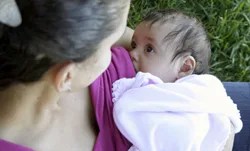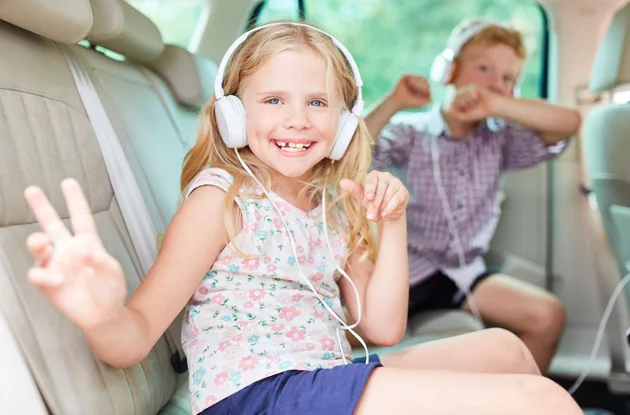 A website on breastfeeding says, “I carry a lightweight blanket when I travel with my breastfed infant. If someone seems to be bothered by my nursing – even though I do it discreetly – I offer them the blanket so that they can cover their eyes.”
A website on breastfeeding says, “I carry a lightweight blanket when I travel with my breastfed infant. If someone seems to be bothered by my nursing – even though I do it discreetly – I offer them the blanket so that they can cover their eyes.”
No reason to stay home because you’re breastfeeding. In fact, when traveling, the alternative, bottle-feeding, tends to be more of a hassle because you have to carry bulky supplies and worry about sterilization, among other things.
If you’re planning a trip with your little one, consider these 10 tips to help you out:
1. Travel-related stresses and altered sleeping and eating patterns do not significantly (if at all) interfere with the flow of breast milk. Try to stay relaxed and rested, and follow your home routine as closely as possible.
2. Forty states in the U.S. have laws allowing women to breastfeed in any public or private location. Twenty-five states exempt breastfeeding from public indecency laws.Virginia allows women to breastfeed on any land or property owned by the state. Puerto Rico requires airports, shopping malls, and specific other locations to have areas that are not bathrooms designated for breastfeeding and diaper changing. For the laws of each state, see: www.ncsl.org/programs/health/breast50.htm. Outside the U.S., attitudes toward breastfeeding in public tend to be more relaxed, with few, if any, restrictions.
3. You may carry bottled breast milk through airport security. Such milk is exempt from rules that limit carry-on liquids to three ounces or less. Breast milk is also exempt from the rule that liquids (and baby food) must be carried in zip-lock plastic bags. However, the milk must be screened by the X-ray machines, a procedure that has no known adverse effect on the milk.
4. Travel-related (and other) vaccines are safe for you and your infant. The only possible exception is the yellow fever vaccine, necessary only for travel to well-defined areas in sub-Saharan Africa and tropical rainforests in South America. There is a theoretical risk of transmitting the vaccine virus via breast milk to the infant and harming the infant. However, as far as is known, this has never occurred.
5. Vaccines you receive do not protect your infant. Infants need to be protected with their own age-specific vaccines.
6. Routine illnesses – including most travel-related ones – are not transmitted through breast milk. Illness is rarely reason to stop nursing. But do consult your healthcare providers when you are ill. Frequent and thorough hand washing reduces the risk of transmitting respiratory or intestinal illnesses, the leading disease categories associated with travel. If you have diarrhea, increase your own fluid intake and nurse more frequently. If you have nausea or are vomiting, also increase your fluid intake but drink only an ounce or two at a time. Wait 20 to 30 minutes between drinks. Consult your healthcare providers back home when in doubt. Carry their telephone numbers.
7. Some medications – including travel-related ones – do pass through breast milk. Ask a travel medicine specialist when traveling to areas where you may have to take medications to prevent malaria or treat diarrhea. Some medications for these illnesses should not be given to infants. Note that no anti-malarial you take protects your infant. Infants need their own age-appropriate medication.
8. Using sunscreens and insect repellents on yourself has no effect on your infant. Follow the same precautions as if you were not nursing.
9. Never breastfeed unrestrained infants in moving cars. Such infants have been propelled into front seats in sudden stops and accidents. Pull over at a safe place to nurse.
10. Consider traveling with a breast pump. Even if you do not routinely pump milk, you may find that a breast pump comes in handy. Travel may disrupt feeding and sleeping schedules – yours and the baby’s. Hotels and airplanes will generally refrigerate the milk for you. A large variety of breast pumps are available for travel, ranging from inexpensive, small manual pumps to elaborate, portable electric ones. Check the web for “breastfeeding, travel” for resources. Many of these sites have informative blogs from mothers who have breastfed on the go.
KARL NEUMANN, MD, FAAP, runs www.kidstraveldoc.com. He is the director of the Family Travel and Immunization Clinic of Forest Hills and Clinical Associate Professor of Pediatrics, Weill Medical College of Cornell University.





















